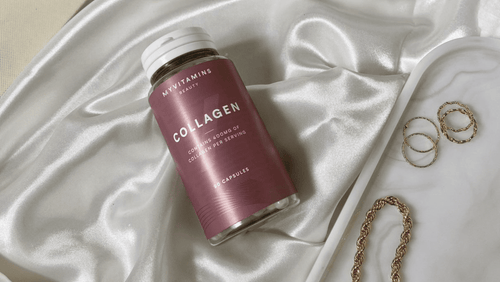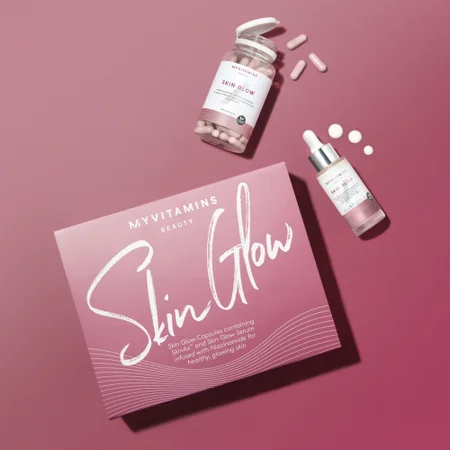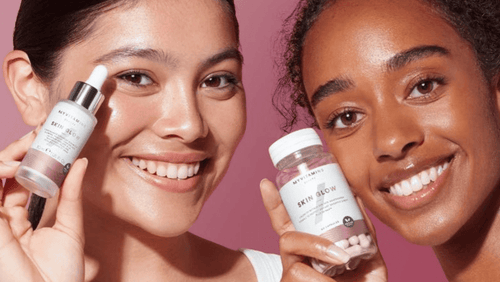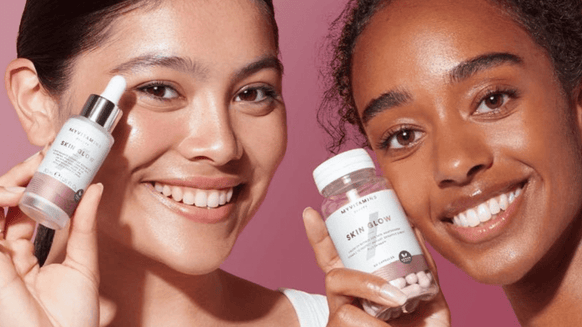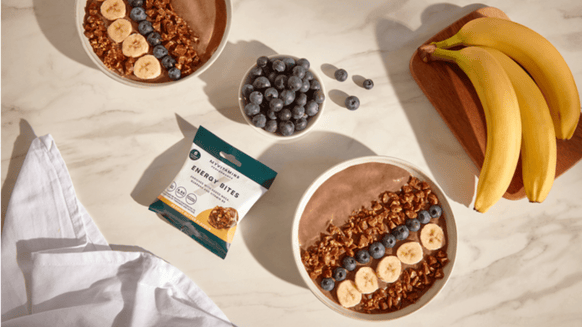What Is Hyaluronic Acid? Skin Benefits And More
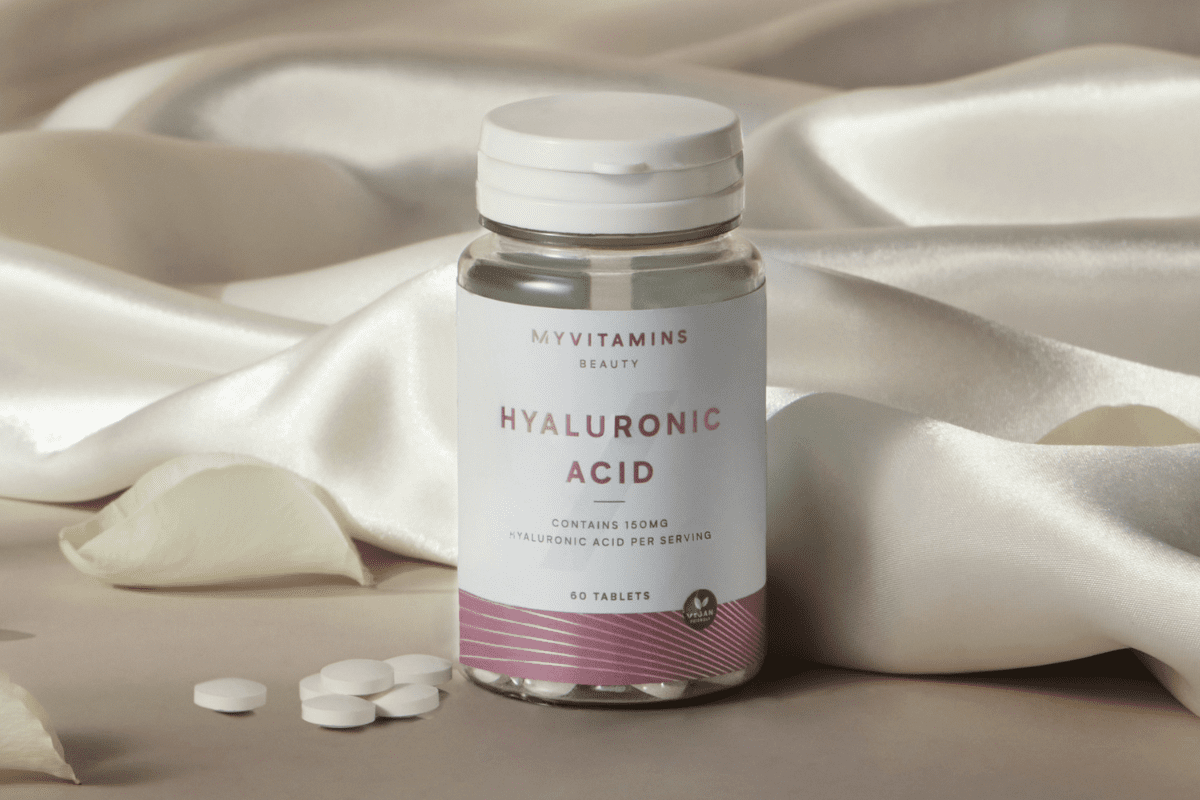
In the world of skincare, few compounds have received as much attention as hyaluronic acid. Its role in enhancing hydration and supporting skin health make it a highly sought-after ingredient in both topical skincare and beauty supplements.
In this article, we'll do a deep dive into hyaluronic acid examining its origins, its uses in skincare, and how to use it to achieve resilient, youthful-looking skin.

What Is Hyaluronic Acid?
Hyaluronic acid (HA) is a naturally occurring compound found across your body, mainly in your skin, connective tissues, and eyes.
One of hyaluronic acid's remarkable properties is its substantial water-binding ability, capable of holding vast amounts of water relative to its molecular weight. This feature is key to keeping the tissue in your body hydrated, therefore contributing to their resilience, elasticity, and general wellbeing.
Apart from its hydrating properties, hyaluronic acid plays a pivotal role in tissue repair and wound healing processes. It helps to regulate inflammation, regenerate cells, and facilitate scar formation, which are all essential to recovery.
Hyaluronic acid is also involved in regulating how your immune system functions and responds. It affects cellular behaviours and activities of immune cells, playing a role in modulating various physiological and pathological conditions such as inflammation, tissue remodeling, and disease progression.

Hyaluronic Acid Skin Benefits
Now we know how hyaluronic acid works in your body, let’s take a look at how it can benefit your skin.
1. Intense hydration
Hyaluronic acid acts as a potent hydrator, locking in moisture by forming a protective barrier, making your skin look plump and resilient.
2. Improved skin texture
Consistent use of hyaluronic acid leads to a smoother complexion by restoring moisture balance, encouraging skin cell renewal, and fortifying the skin barrier.
3. Reduced fine lines and wrinkles
Hyaluronic acid combats signs of ageing by replenishing lost moisture, giving the skin a fuller look, and reducing the visibility of wrinkles.
4. Soothing and calming
Its gentle, non-irritating properties make hyaluronic acid an excellent choice for sensitive or inflamed skin, providing relief from redness and irritation.
5. Enhanced skin barrier function
Hyaluronic acid reinforces the skin's protective barrier, enhancing its resilience against environmental stressors and promoting moisture retention for long-term skin health (1).

How To Use Hyaluronic Acid
Hyaluronic acid is available in various forms, including gummies, tablets, and serums. Hyaluronic acid gummies and tablets are oral supplements designed to promote skin hydration and overall health from within.
Or you can make hyaluronic acid part of your topical skincare routine with serums and face masks. These deliver concentrated doses of hyaluronic acid to target specific concerns such as dryness.
Hyaluronic Acid Gummies
Hyaluronic Acid Gummies are a convenient and delicious way to keep your skin hydrated and support your overall wellbeing. These mixed berry-flavoured gummies are formulated with 100mg of high-quality hyaluronic acid and are designed to promote skin health from the inside out.
Hyaluronic Acid Tablets
Or, if you prefer, you can take hyaluronic acid as a tablet. Developed with 150mg of hyaluronic acid, these tablets are designed to nourish your skin from within. For optimal results, take one tablet daily with water, preferably alongside a meal.
Hyaluronic Acid Serum
Serums are lightweight, topical skincare products that contain active ingredients to keep your skin looking and feeling its best.
Skin Glow Serum is enriched with hyaluronic acid, niacinamide, vitamin C, and vitamin E to deeply hydrate and rejuvenate your skin.
Combine it with Skin Glow Capsules for the perfect skincare duo. These convenient capsules are packed with zinc, copper, vitamin C, and SkinAx, working to enhance skin health and radiance from within.
SkinAx, a popular beauty ingredient, can improve skin firmness and elasticity, and reduce dark circles and skin redness (2).
For optimal results, integrate both products into your daily routine: apply 3-4 drops of the Skin Glow Serum morning and evening, and take two Skin Glow Capsules daily with water.
Talk To Your Dermatologist
Myvitamins are not making any medical claims in this article. If you are interested in introducing hyaluronic acid into your skincare regime, consider speaking with your dermatologist.
Take Home Message
In summary, hyaluronic acid is a versatile skincare ingredient, offering a multitude of benefits for skin hydration, texture improvement, and anti-ageing effects. Whether taken as an oral supplement or applied topically through a serum, hyaluronic acid works wonders in promoting skin health and radiance.

FAQs
Is hyaluronic acid a natural ingredient?
Hyaluronic acid occurs naturally in the human body, particularly in the skin, connective tissues, and eyes. It is also found in other animals and some bacterial strains.
What does hyaluronic acid do to your face?
Hyaluronic acid deeply hydrates the skin, replenishing moisture levels and improving elasticity. It helps to smooth fine lines and wrinkles, while also soothing and calming the skin, promoting a healthy, radiant complexion.
Is it OK to use hyaluronic acid every day?
Yes, it is generally safe to use hyaluronic acid every day as part of your skincare routine. Its gentle and hydrating properties make it suitable for daily use, helping to maintain skin moisture levels and promote overall skin health.
What are the health benefits of taking hyaluronic acid?
The health benefits of taking hyaluronic acid include improved joint health, enhanced eye health, and support for healthy skin, hair, and nails. Hyaluronic acid supplements can also aid in wound healing and promote overall hydration and elasticity in the skin.
When is the best time to take hyaluronic acid?
The best time to take hyaluronic acid supplements is typically in the morning with a meal or as directed by a healthcare professional. This allows for optimal absorption and utilization of the nutrient throughout the day.

